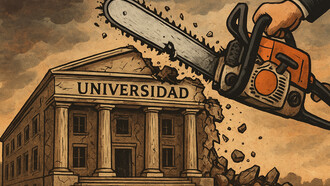President Donald Trump’s ban on refugees and immigrants from seven Muslim-majority countries immediately ignited protests across the United States. Thousands gathered outside the White House, in New York, in Chicago, and in other cities across the nation. On February 16, businesses closed, students skipped school, and immigrants were encouraged not to shop in support of the social-media-led protest called “A Day Without Immigrants.”
Seven days later, on February 23, in the freezing North Dakota winter, another protest was ended. Law enforcement in riot gear entered the Oceti Sakowin camp, and supported by Humvees, cleared the largest of several camps on the edge of Standing Rock Sioux Reservation. Protesters had been living on this land for months in support of the members of the Standing Rock Sioux. After enduring pepper spray, tear gas, rubber bullets, German Shepards and water hoses, reminiscent of attacks against children protesting segregation in Birmingham, Alabama, in 1963, the last of the Dakota Access pipeline opponents abandoned their protest camp after almost a year. The Standing Rock Sioux joined by members of 200 indigenous tribes, environmentalists, clergy, military veterans and others were protesting the Dakota Access pipeline which would be built beneath the primary water supply of several tribal communities, endangering it and desecrate sacred burial sites.
These two protests create a space to discuss the different relationships that minority groups in the United States have with the ruling majority. The late anthropologist, Professor John Ogbu, utilized a tripartite organizing framework to describe minority groups in the American social system. This framework was based upon the majority-minority relationship. The “autonomous” minorities; i.e., Mormons, Jews, Amish, may be subject to some prejudice and discrimination but the relationship with the dominant group is not characterized by rigid stratification; these groups are not perceived to be innately inferior. The second group, for whose rights many progressives are fighting to protect are “voluntary” minorities; i.e., immigrants and refugees. This group voluntarily moves to the United States to improve their economic, political or social position relative to the position in their homeland. Certain groups of voluntary immigrants -- Cuban refugees -- serve United States political interests.
The minority groups lowest on the social rung in the United States are considered “caste” or “involuntary” minorities. Among this group are African Americans, Native Americans, Mexican Americans, Puerto Rican Americans, Pacific Islanders. This group of minorities has a legacy of having been enslaved, conquered, or colonized. They have involuntarily been incorporated into American society as subordinate groups whose position in the society is established by law or custom such as Jim Crow segregation. What most distinguishes this group of minorities from the others is that they are regarded as inherently inferior by the dominant group in all respects: biological, cultural and intellectual. They have been stigmatized and excluded based upon stereotypical and negative images that are culturally conditioned in the American mind.
The current wave of protests to protect the rights of immigrants allows the adherence to progressive values while not having to deal with the values that form and perpetuate the racial caste system that exists in the United States. Protesters are beside themselves with outrage over the treatment of its new immigrants, but when it comes to the plight of its caste minorities, their passion and zeal for justice seems to dissipate. Placards and signs carried by protesters carry messages like “Standing strong to support and protect All of the people” and “This is racism.” Does this outrage extend to the environmental racism being directed toward the Standing Rock Sioux or the killing and disproportionate incarceration of African American men? While the author supports the protection of immigrant rights, two messages, “America was built by refugees,” and “Immigrants made America great,” must be addressed. Immigrants certainly have helped to make America a great nation; however, for close to 300 years, the unpaid labor of African slaves on stolen Native American land financed the Industrial Revolution, most of the Fortune 500 companies and helped to establish the United States as a world economic power.
Will the anger and outrage that fueled the protests to protect the rights of immigrants and voluntary minorities extend to America’s involuntary caste minorities? Will the same moral indignation inspire the dissolution of the American racial caste system? Is this a reaction to President Trump or the beginning of a commitment to require America to live up to her democratic principles? Will progressives and other good Americans use this as an opportunity to finally make America support and protect ALL her people?















